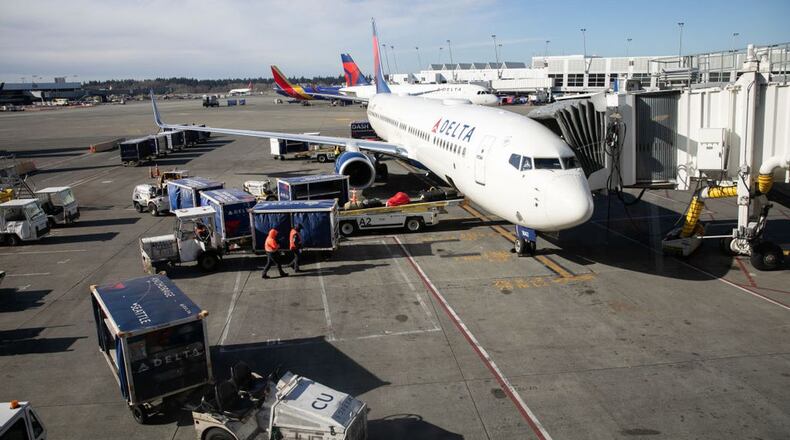Delta Air Lines says it is cutting at least 80% of its flights due to the coronavirus pandemic, yet it is still operating flights to all points in its domestic route network.
The airline says in a letter to the U.S. Department of Transportation that it is consolidating operations, reducing the number of flights it operates and using smaller planes, "but all while ensuring that all domestic points Delta served before the onset of this crisis continue to receive at least a minimum level of essential access to Delta's network."
Atlanta-based Delta previously said it was cutting at least 70% of flights, including 80% of its international service. That has now increased to at least an 80% reduction across Delta's system. The airline says it has parked more than 600 planes and consolidated facilities at many airports.
The number of passengers passing through airport security checkpoints has declined as much as 95%, according to figures from the Transportation Security Administration.
"This situation is getting worse each day with no end in sight," the industry group Airlines for America said in comments to the DOT.
Airports including Atlanta have seen many routes cut by Delta and other airlines, meaning some travelers may need to connect through hubs for essential trips within the United States.
And airlines have also cut a large portion of their international flights due to border closures, other travel restrictions and reduced demand, limiting those travel options to and from those countries.
Delta said Friday that it has operated 16 private charters to bring nearly 4,000 Americans back from Argentina, Chile, El Salvador, Guatemala, Italy, South Korea and the Philippines. It plans additional charters from Argentina, Australia, India, Mexico and Nigeria to serve nearly 2,400 more Americans.
The federal stimulus under the CARES Act says that for airlines that receive aid, the U.S. transportation secretary has the authority to require them to maintain flights through Sept. 30 “to ensure services to any point served by that carrier before March 1, 2020.”
In practice, the DOT plans to apply the requirement only to U.S. airports, since there is a global health advisory urging U.S. citizens to avoid all international travel. And for places served by multiple airports, the department says carriers would not need to maintain service to all airports serving that point and could instead consolidate service at a single airport.
Delta submitted its comments to the DOT in a letter in support of an order that allows airlines to consolidate service but maintain a certain minimum level of service. The department asked for comments on its proposal before it issues a final order.
Under the proposal, airlines that receive financial assistance would not have to maintain service on all routes from an airport it serves. But the department also said it wants each airline to continue to serve airports that had flights at least five days a week with five-day-a-week service, and to serve airports that had fewer flights with at least one flight a week.
Meanwhile on Wednesday, President Donald Trump indicated he is looking at restricting travel into hot spots. “Some of those flights I didn’t like from the beginning,” Trump said. “Closing up every single flight on every single airline, that’s a very, very, very rough decision. But we are thinking about hot spots.”
The DOT also says its provisions “do not authorize any coordination among air carriers that would violate the antitrust laws,” and it invited comments on its proposal.
Airlines can seek exemptions for airports “that they believe are not reasonable or practicable to serve.”
Delta said in its comments to the DOT that the requirement to maintain service to points served before March 1 could be a problem for seasonal routes, such as to ski destinations in Colorado. The airline proposed that seasonal service be excluded from the service requirement.
Delta also said it supports exemptions for U.S. tourist destinations that have imposed bans or restrictions on visitors, including the U.S. Virgin Islands and Hawaii.
Some airlines voiced opposition to the DOT’s proposal. Las Vegas-based Allegiant Air, for example, submitted comments saying it is “deeply concerned” with the proposal and said the financial assistance from the federal government would “be squandered on flying empty planes to and from cities where no one is traveling.”
Airlines for America asked the DOT to consider exercising discretion in the future to determine whether requiring the same service as proposed “is reasonable or practicable,” as travel continues to fall.
About the Author
The Latest
Featured


